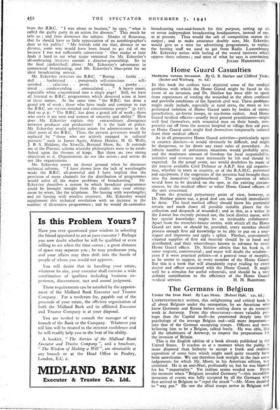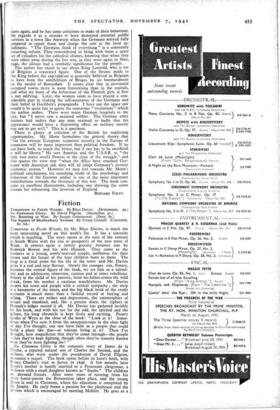The Germans in Belgium
Under the Iron Heel. By Lars Moen. (Robert Hale. ' t2s.6(1.)
UNPRETENTIOUSLY written, this enlightening and critical book is all about Belgium under the occupation, by an American who knew Germany and Russia before settling down to do research work in Antwerp. From this observatory—more valuable per- haps than the Capital itself—he penetrated deeply into the psychology of the average Belgian and—still more important— into that of the German occupying troops. Officers and men, believing him to be a -Belgian, talked freely. He was able, like all the inhabitants of Antwerp, to inspect the preparations for the invasion of Britain.
This is the English edition of a book already published in the United States. It reaches us at a moment when the public is more disposed than hitherto to accept a frank and realistic exposition of some facts which might until quite recently have been unwelcome. We can therefore look straight in the face some judgements for which Mr. Moen in his American edition, was criticised. He is an anti-Nazi, profoundly sta; but he was blamed for his " impartiality." Yet realism seems needed now. From the moment when " Belgium invaded Germany "—this incredible inversion of events was fully accepted by all the Germans who first arrived in Belgium. to " repel the attack "—Mr. Moen decided to " stay put." He saw the allied troops arrive in Belgium and
leave again, and he has some criticisms to make of their behaviour. He regards it as a mistake to have destroyed essential public services in a town like Antwerp when the Germans arrived fully prepared to repair them and charge the cost to the local in- habitants. " The Germans think of everything " is a constantly recurring refrain. They remembered to bring with them a spare set of cylinders for the cathedral chimes, knowing that when they were taken away during the last war, as they were again in May, 1940, the silence had a symbolic significance for the people. The author has much to say about King Leopold, who is for all Belgians a venerates figure. One of the threats made to the King before the capitulation is generally believed in Belgium to have been the annihilation of Bruges by air bombardment on the model of Rotterdam. It seems clear that in provincial occupied towns there is more fraternising than in the capitals, and what we learn of the behaviour of the Flemish girls at first is not edifying. Later, the women seem to have played a con- siderable part in shaking the self-assurance of the Germans and their belief in Goebbels's propaganda. 1 have not the space nor would it be quite fair to quote the numerous " revelations " which the author makes. There were many German hospitals in the city, but " I never saw a maimed soldier. The German army doctors had orders that any man maimed so badly that his appearance would have a depressing effect on military morale was not to get well." This is a specimen.
There is plenty of criticism of the British for neglecting opportunities. Mr. Moen formulates the general theory that " for the average European. economic security in the Europe of tomorrow will be more important than political freedom. If he can have both, so much the better, but if one has to be sacrificed it will be liberty." He sees America and the U.S.S.R. as " the only two major world Powers at the close of the struggle," and also quotes the view that " when the Allies have smashed Ger- many with American aid, they will all adopt Germany's present economic system." However we may feel towards Mr. Moen's political conclusions, his searching study of the psychology and behaviour of the German soldier is one of the most important contributions towards the literature of this war. The book con- tains 13 excellent illustrations, including one showing the scene chosen for rehearsing the invasion of England.
BERNARD FOLEY.























 Previous page
Previous page